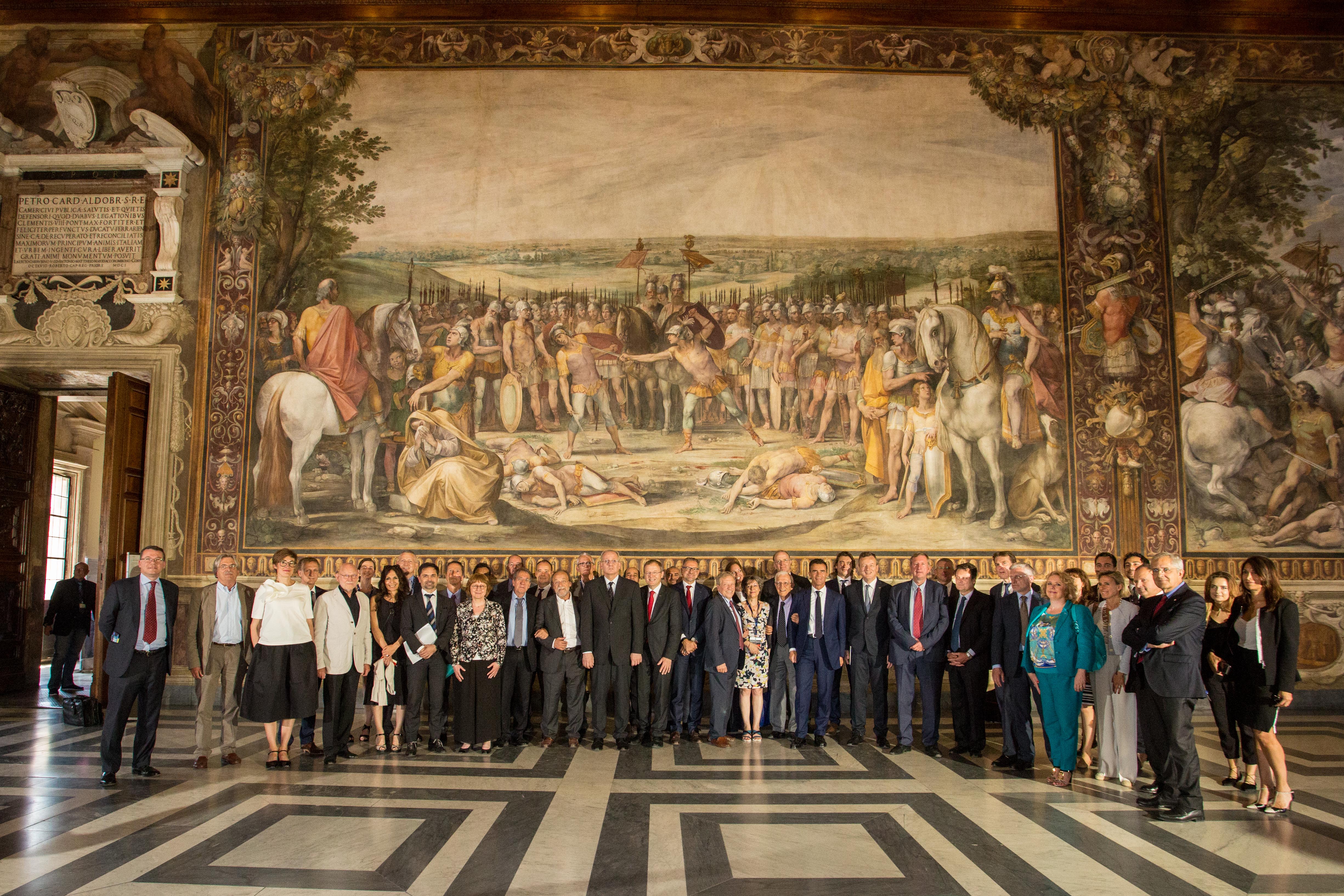This year, Europe celebrated the 60th anniversary of the signing of the Treaties of Rome - 25 March 1957 was a seminal moment in European integration. Since then, Europe has developed in many unforeseen ways.
The founding fathers may have dreamed of a single European currency and borderless travel – it is less clear if they were thinking of smartphones and earth observation satellites to monitor the environment.
currency and borderless travel – it is less clear if they were thinking of smartphones and earth observation satellites to monitor the environment.
“Maybe they weren’t thinking of a space strategy in 1957; Yuri Gagarin completed the first orbit in 1961,” said GSA Executive Director Carlo des Dorides at a high-level conference in Rome on June 15. “But now – 60 years later – we can say that space has a very good story to tell about European co-operation. Hundreds of thousands of citizens are benefitting from space. People may not know, but Galileo is entering more and more into their daily lives.”

GSA Executive Director Carlo des Dorides speaking at the Rome event
Watch this: Galileo goes live
Roberto Battiston, president of the Italian Space Agency, spoke at the conference on how the EU’s space programmes foster and support industry and research: “Europe has always been the opportunity to achieve together what we could not achieve alone. This was true of the European Space Agency and it is true of the investment in space infrastructure including Galileo and Copernicus.”
Italian Education Minister Valeria Fedeli opened the event, noting that space is a “critically important driver for our economy”. Italy is a good example of how one country is drawing on Europe’s shared infrastructure. Over the coming years, Italy will invest €1 billion in this field; half of this investment will come from private sources.
‘Europe is now the second space power in the world’
Internal Market, Industry, Entrepreneurship and SMEs Commissioner Elżbieta Bieńkowska reflected on the milestones of European Space Policy and programmes. The European Space Strategy adopted at the end of March will build on work done so far to ensure that Europe’s talents, expertise and investments enable Europe to anticipate the opportunities of tomorrow. Bieńkowska said: “Europe is now the second space power in the world”.
Coming back down to Earth, DG GROW’s Deputy Director General for Space Pierre Delsaux reminded us that though we were celebrating the end of roaming charges, many Europeans don’t travel outside their own countries. However, most people use smartphones dependent on satellite navigation or at the very least follow the weather forecast. So whether you are at home or away, Europe’s space policy is making a difference to your life.
Copernicus
Images from Copernicus, the world’s most ambitious earth observation and monitoring programme, were presented at the conference. European Space Agency Director General Jan Woerner referred to the Sentinel satellites as the backbone of the Copernicus programme.
Insights from satellites will play a critical role in many societal challenges, including monitoring the state of the environment to better understand climate change.
Italian Civil Protection Director Fabrizio Curcio, showed how Copernicus data and information supported emergency management activities. Etna eruptions, earthquakes, landslides and floods, but also extraordinary events such as the Costa Concordia wreckage or the Xylella Fastidiosa phytosanitary crisis put Copernicus to the test in real-life and real-time stress tests – the data provided proved invaluable.
ECMWF (European Centre for Medium-Range Forecast) Director General Florence Rabier spoke at the conference on how space policy serves citizens. When created 40 years ago, the aim was to forecast the weather two to ten days ahead – ECMWF can now predict up to a month or several months ahead. Rabier is happy to say: “We can be proud in Europe. Our forecasts are routinely the best – as judged by the World Meteorological Organisation. We can help other countries too – we were the first to detect that Hurricane Sandy would turn and hit the east coast of America.”
The event, while reflective on achievements to date, also looked to the future. The EU’s continued investment in space gives the private sector the confidence to invest. Giovanni Sylos Labini, the CEO of Planetek and Vice Chairman of the European Association of Remote Sensing Companies (EARSC) spoke about space as a motor for economic growth. Labini said that the market is growing rapidly year on year by around 10%, “public investment is crucial, but increasingly private equity and finance is coming in, making investment sustainable.”
Media note: This feature can be republished without charge provided the European GNSS Agency (GSA) is acknowledged as the source at the top or the bottom of the story. You must request permission before you use any of the photographs on the site. If you republish, we would be grateful if you could link back to the GSA website (http://www.gsa.europa.eu).